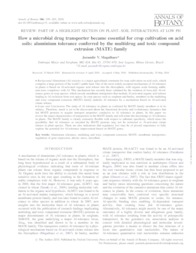How a microbial drug transporter became essential for crop cultivation on acid soils: aluminium tolerance conferred by the multidrug and toxic compound extrusion (MATE) family.
How a microbial drug transporter became essential for crop cultivation on acid soils: aluminium tolerance conferred by the multidrug and toxic compound extrusion (MATE) family.
Author(s): MAGALHAES, J. V. de
Summary: Background: Aluminium (Al) toxicity is a major agricultural constraint for crop cultivation on acid soils, which comprise a large portion of the world's arable land. One of the most widely accepted mechanisms of Al tolerance in plants is based on Al-activated organic acid release into the rhizosphere, with organic acids forming stable, non-toxic complexes with Al. This mechanism has recently been validated by the isolation of bona-fide Al-tolerance genes in crop species, which encode membrane transporters that mediate Al-activated organic acid release leading to Al exclusion from root apices. In crop species such as sorghum and barley, members in the multidrug and toxic compound extrusion (MATE) family underlie Al tolerance by a mechanism based on Al-activated citrate release.
Publication year: 2010
Types of publication: Journal article
Unit: Embrapa Maize & Sorghum
Observation
Some of Embrapa's publications are published as ePub files. To read them, use or download one of the following free software options to your computer or mobile device. Android: Google Play Books; IOS: iBooks; Windows and Linux: Calibre.
Access other publications
Access the Agricultural Research Database (BDPA) to consult Embrapa's full library collection and records.
Visit Embrapa Bookstore to purchase books and other publications sold by Embrapa.

